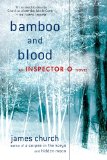Summary | Excerpt | Reviews | Beyond the book | Read-Alikes | Genres & Themes | Author Bio

The Lord of Death is the sixth of Eliot Pattison's books to feature Shan Tao Yun, a disgraced former Chinese investigator whose fate has been increasingly tied to that of Tibet and its citizens, and it is perhaps the strongest entry in the series to date. An intricate yet logical plot, deep character construction and a wonderful sense of atmosphere combine to form a truly top-notch mystery novel.
The novel's backdrop is an area of the world in the throes of rapid change. Not only are the Tibetans influenced by Chinese Communist rule, but the country is rapidly becoming a tourist destination, which has also had a huge impact on the Tibetan way of life. Pattison does an excellent job of portraying this confluence of cultures.
Shan stood blinking in the brilliant morning sun as the door slammed shut behind him. Shogo town was still waking up. A small flock of sheep wandered along the cracked pavement of the street. A group of shiny sport utility vehicles sped by filled with tourists bound for the Himalayas after a side trip to see the center of commerce at the top of the world. Somewhere someone burned incense, an offering to the gods for the new day. He had taken two stumbling steps before he noticed the well-dressed Tibetan sitting at a table outside the tea shop across the street. He paused as two army trucks, packed with border commandos, sped past in a cloud of dust. Then he limped across the road.
The characters are equally well-drawn, and even minor personages have a multi-dimensionality that adds realism to the story. The protagonist is particularly appealing; Shan hasn’t changed much over the decade that has elapsed since readers encountered him in Pattison’s first novel, The Skull Mantra. Both old and new followers of this series will be drawn to the character's insightfulness, quiet spirituality and fervor for the truth.
The mystery at the book's core is complex, and readers may spend much of their time in a state of confusion; as I read I sensed all the pieces of the puzzle were there, but, like Shan, I didn't quite know how they fit together until the very end. Pattison doesn't always offer his readers all the information available to Shan (for example, Shan finds an old photograph and recognizes a person in it, but the author doesn't reveal the identity of that individual until the book's denouement). In addition to heightening the suspense, this technique makes the mystery's conclusion exceptionally satisfying as all the clues click into place.
One criticism of Pattison's earlier novels is that his passion for the plight of the Tibetans overwhelms the plot, at times allowing it to bog down into political discourse. Such is not the case with The Lord of Death. The conflict between Tibet and China is crucial to the mystery, but it's so tightly woven into the story that the politics don't become burdensome.
The novel stands just fine on its own in spite of being the sixth in the series; readers will not feel like they’ve missed out on something crucial by not having read the previous Shan novels. There's quite a lot of back-story to the plot, particularly concerning the current fate of Shan's only son, but the author fills in enough of the blanks to prevent his readers from feeling they need to have perused the other novels to fully understand Shan’s motivations, while at the same time avoiding excessive retelling of prior events that could bore those already familiar with his previous work.
In short, The Lord of Death is a very tight, well-crafted mystery novel, and one that is sure to appeal to a wide audience.
The Inspector Shan series to date:
Pattison is also actively at work on a new series set in Colonial America which started with Bone Rattler (2007), and was followed by Eye of the Raven in late 2009. More about the author, and background reading on Tibet at eliotpattison.com.
![]() This review was originally published in The BookBrowse Review in July 2009, and has been updated for the
July 2010 edition.
Click here to go to this issue.
This review was originally published in The BookBrowse Review in July 2009, and has been updated for the
July 2010 edition.
Click here to go to this issue.

If you liked The Lord of Death, try these:

by Lisa Brackmann
Published 2011
American Ellie Cooper, deserted by her husband, has made a number of friends in China. But suddenly one of them disappears, and security organizations are hounding her for information. Contacted through an online role-playing game by a group claiming to be friends of Lao Zhang asking her for help, Ellie does the only thing she can - keep on ...

by James Church
Published 2010
When the wife of a North Korean diplomat in Pakistan dies under suspicious circumstances, O is told to investigate, with a curious proviso: Don’t look too closely at the details, and stay away from the question of missiles. Soon, however, the Inspector discovers he is up to his ears in missiles - and somebody wants him dead.
Your guide toexceptional books
BookBrowse seeks out and recommends the best in contemporary fiction and nonfiction—books that not only engage and entertain but also deepen our understanding of ourselves and the world around us.